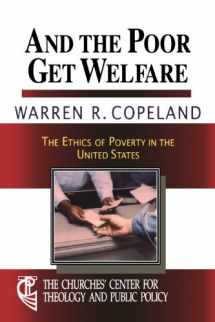
And the Poor Get Welfare: The Ethics of Poverty in the United States (Churches Center for Theology and Public Policy)
Book details
Summary
Description
Cries for the elimination of welfare rise at the very time that the amount of poverty in the United States grows. And the Poor Get Welfare is an ethical and theological analysis of both of these realities. It sets the context for this analysis by surveying the current situation and the histories of poverty and welfare as public policy issues in the United States.
The heart of Copeland's ethical analysis is the critical reading of the very different approaches to poverty and welfare of four recent influential writers on poverty and welfare: Charles Murray, Lisbeth Schorr, Lawrence Mead, and Frances Fox Piven. In each case, he describes the author's basic policy position but also asks how each views individuality, community, worth, motivation, and hope.
On the basis of the answers to these ethical questions, Copeland identifies theological parallels to each of the four positions. He then offers his own contemporary public theology rooted in process theology, but expressed in everyday language about his own experience. He uses this theology to explore the deeper meaning of individuality, community, worth, motivation, and hope.
In the final three chapters, this volume proposes fuller understandings of poverty and of welfare and then returns to contemporary public policy and proposes principles for reform. All of this is based upon Copeland's contemporary public theology and the ethical insights drawn from it.


We would LOVE it if you could help us and other readers by reviewing the book
Book review



